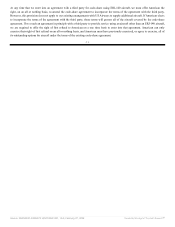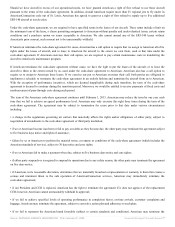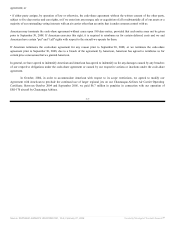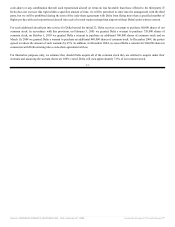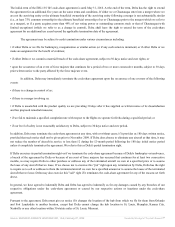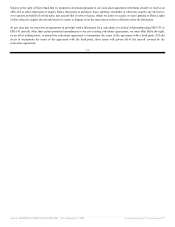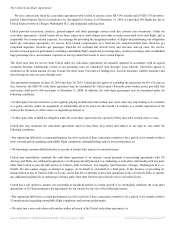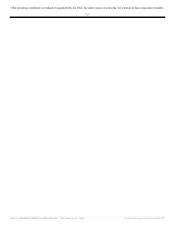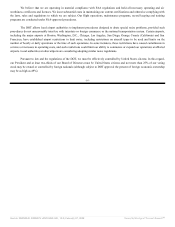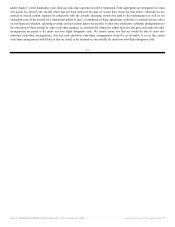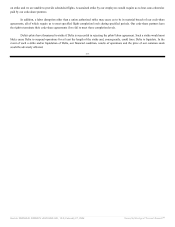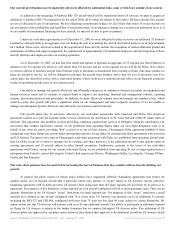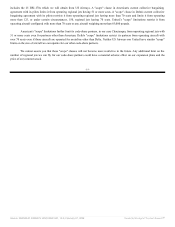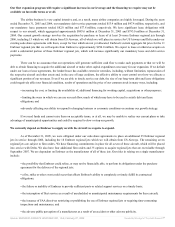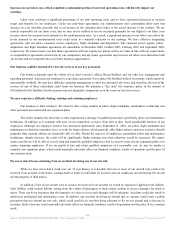Frontier Airlines 2005 Annual Report Download - page 29
Download and view the complete annual report
Please find page 29 of the 2005 Frontier Airlines annual report below. You can navigate through the pages in the report by either clicking on the pages listed below, or by using the keyword search tool below to find specific information within the annual report.
The call option is governed by certain limitations relating to the number of aircraft for which the call option is exercised, notice
requirements, indemnification in the event of a lease assumption, calculation of the purchase price in the event of a sale, payment of
aircraft ownership costs, delivery of spare parts and reimbursement of prepaid rent.
If we enter into certain corporate transactions, including a merger, sale of substantially all of our or our subsidiaries assets, or issuance
or sale of stock of us or our subsidiaries representing 20% beneficial ownership or voting control, then we must grant United a right of
first refusal to enter into the proposed transaction on the same or comparable terms. If United and we cannot agree on the terms, then
we can enter into the transaction with a third party, but not on terms more beneficial to the third party than those that were offered to
United.
In general, we have agreed to indemnify United and United has agreed to indemnify us for any damages caused by any breaches of
each party's respective obligations under the code-share agreement or caused by each party's respective actions or inactions under the
code-share agreement.
United will pay aircraft ownership costs and reserves the right to finance any aircraft allocated for United Express services, subject to
certain limitations. In addition, United will have the right to recall furloughed pilots required to be hired by us. Except for certain
exceptions, United does not have a right to early termination of the ERJ-170 code-share agreement.
We have assigned the obligation to operate some or all of the aircraft to be operated under this code-share agreement from Republic
Airline to Shuttle, after obtaining United’s approval.
Competition and Economic Conditions
The airline industry is highly competitive. We not only compete with other regional airlines, some of which are owned by or
are operated as code-share partners of major airlines, but also face competition from low-fare airlines and major airlines on some of
our routes.
The principal competitive factors in the regional airline industry are location, fare pricing, frequent flyer loyalty programs,
customer service, routes served, flight schedules, aircraft types and code-share relationships. Certain of our competitors are larger and
have significantly greater financial and other resources than we do. Moreover, federal deregulation of the industry allows competitors
to rapidly enter our markets and to quickly discount and restructure fares. The airline industry is particularly susceptible to price
discounting because airlines incur only nominal costs to provide service to passengers occupying otherwise unsold seats.
Generally, the airline industry is highly sensitive to general economic conditions, in large part due to the discretionary nature
of a substantial percentage of both business and pleasure travel. In the past, many airlines have reported decreased earnings or
substantial losses resulting from periods of economic recession, heavy fare discounting, high fuel prices and other factors. Economic
downturns combined with competitive pressures have contributed to a number of bankruptcies and liquidations among major and
regional carriers. The effect of economic downturns is somewhat mitigated by our fixed-fee arrangements with respect to our flights.
In addition, if our major airline code-share partners remain financially strained by low ticket prices or high fuel prices, they will likely
seek to reduce our fixed-fees or cancel a number of flights in order to reduce their costs.
Government Regulation
All interstate air carriers are subject to regulation by the Department of Transportation, referred to as the DOT, the Federal
Aviation Administration, or FAA, the TSA, or Transportation Security Administration and certain other governmental agencies.
Regulations promulgated by the DOT primarily relate to economic aspects of air service, those of the TSA to security and those of the
FAA to safety. The FAA requires operating, air worthiness and other certificates; approval of personnel who may engage in flight
maintenance or operations activities; record keeping procedures in accordance with FAA requirements; and FAA approval of flight
training and retraining programs. Generally, governmental agencies enforce their regulations through, among other mechanisms,
certifications, which are necessary for our continued operations, and proceedings, which can result in civil or criminal penalties or
revocation of operating authority. The FAA can also issue maintenance directives and other mandatory orders relating to, among other
things, grounding of aircraft, inspection of aircraft, installation of new safety-related items and the mandatory removal and
replacement of aircraft parts that have failed or may fail in the future.
Source: REPUBLIC AIRWAYS HOLDINGS INC, 10-K, February 27, 2006 Powered by Morningstar® Document Research℠



